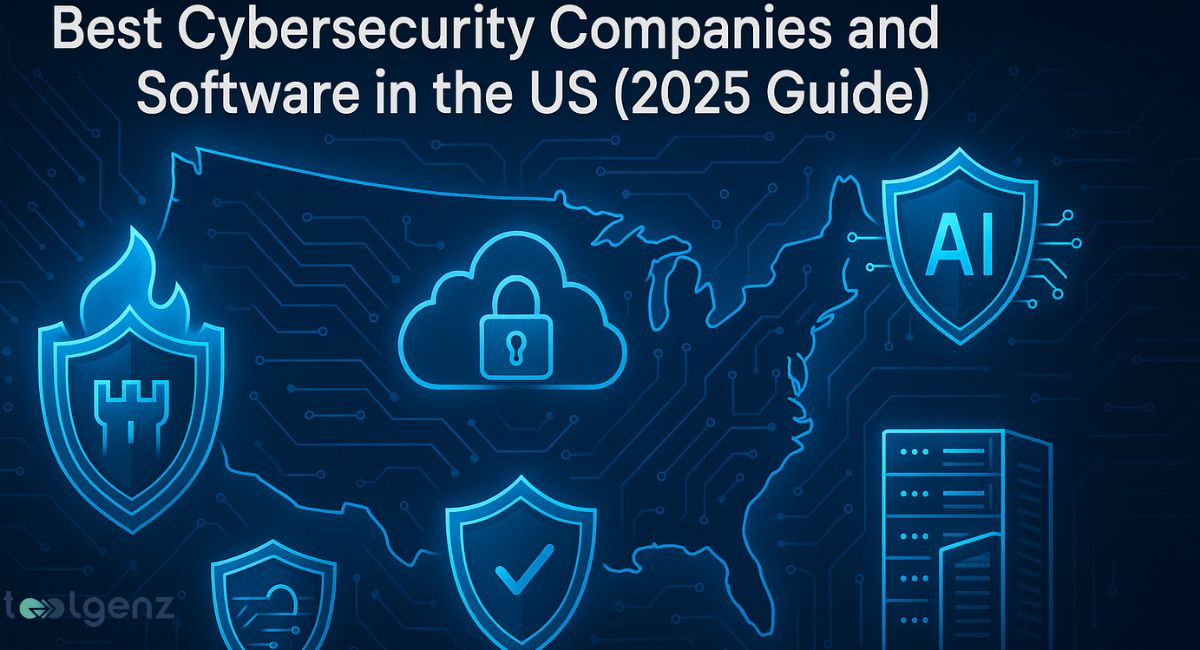In today’s fast-changing digital world, keeping your data safe is more important than ever.
With cyberattacks growing stronger and more common, both large and small businesses need strong protection.
This 2025 guide explores the best cybersecurity companies and software in the US, offering deep insights into the tools that protect your systems, networks, and cloud environments.
From malware prevention tools to firewall protection systems, the right solution can stop threats before they start.
Whether you’re running a startup or a growing company, investing in reliable endpoint security software and cloud-based cybersecurity is essential.
Let’s dive into the top platforms trusted across the United States today.
These tools not only shield sensitive data but also support compliance regulations, improve incident response, and enhance user access control.
Choosing the right cybersecurity software means taking a proactive step toward long-term protection and peace of mind.
What is Cybersecurity Software?
Cybersecurity software protects your computer systems, mobile devices, networks, and cloud data from online attacks. It fights against malware, phishing, ransomware, and other harmful activities.
Without it, your business is exposed to major threats like data breaches, identity theft, or service downtime.
This software acts as a shield between your systems and the outside world.
The most popular tools include antivirus software, firewall protection, encryption tools, and threat detection programs.
Some software is designed for larger firms while others are built for cybersecurity for small businesses.
Even early-stage startups are turning to lightweight cybersecurity tools to defend against threats from day one.
A modern security solution will include features like AI-powered cyber defense, secure cloud access, and user behavior analytics.
Choosing the right cybersecurity platform depends on your company’s size, risk level, and budget. The best tools are easy to manage, provide real-time protection, and evolve quickly to defend against new threats.
Investing early can save you from costly data loss or legal trouble down the line.
Key Features and Benefits of Cybersecurity Software
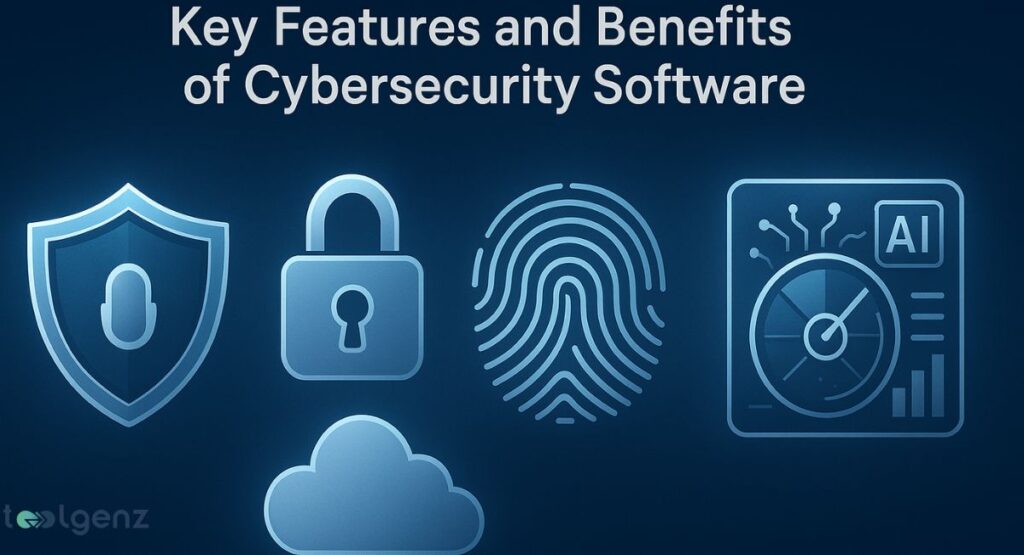
Modern cybersecurity platforms offer many tools to protect sensitive business data. Key features include endpoint protection, multi-factor authentication (MFA), and SIEM (Security Information and Event Management) tools.
Together, these systems help spot unusual activity fast and alert you in real time.
The benefits are huge. You reduce the risk of data breaches, improve compliance regulations, and protect customer trust.
For cyber threats for SMBs, tools like malware protection and insider threat detection are essential.
Many companies also use incident response platforms and patch management tools to keep systems safe 24/7.
These platforms also support regular vulnerability assessments and behavioral analytics, helping you stay ahead of evolving threats.
As cyberattacks grow more advanced, integrating these tools into your daily operations becomes a key part of smart cyber risk management.
Top Cybersecurity Companies in the US (2025)
In 2025, several American companies lead the cybersecurity space. CrowdStrike is a big name offering cloud-based endpoint protection and fast threat detection.
Palo Alto Networks delivers excellent firewall systems and user access control. Fortinet is known for advanced cyber threat intelligence and cost-friendly packages for SMBs.
Another major player is Trellix—formed by combining McAfee Enterprise and FireEye—which offers powerful AI-driven threat response capabilities. Cisco continues to shine with network security and zero trust security options.
These firms offer a mix of cloud security, SIEM tools for small businesses, and scalable tools for larger corporations.
Their continuous innovation, commitment to compliance regulations, and proven ability to handle modern cyber threats make them trusted partners for businesses across industries.
As the demand for real-time protection grows, these leaders are also expanding services like managed detection and response (MDR) and penetration testing services to cover every security layer.
| Company Name | Known For | Headquarters |
| CrowdStrike | AI-based endpoint protection | Austin, Texas |
| Palo Alto Networks | Network security & firewalls | Santa Clara, CA |
| Fortinet | Affordable cybersecurity solutions | Sunnyvale, CA |
| Trellix | Advanced detection & response | Milpitas, CA |
| Cisco Systems | Enterprise-grade firewall protection | San Jose, CA |
Other Notable Cybersecurity Market Leaders
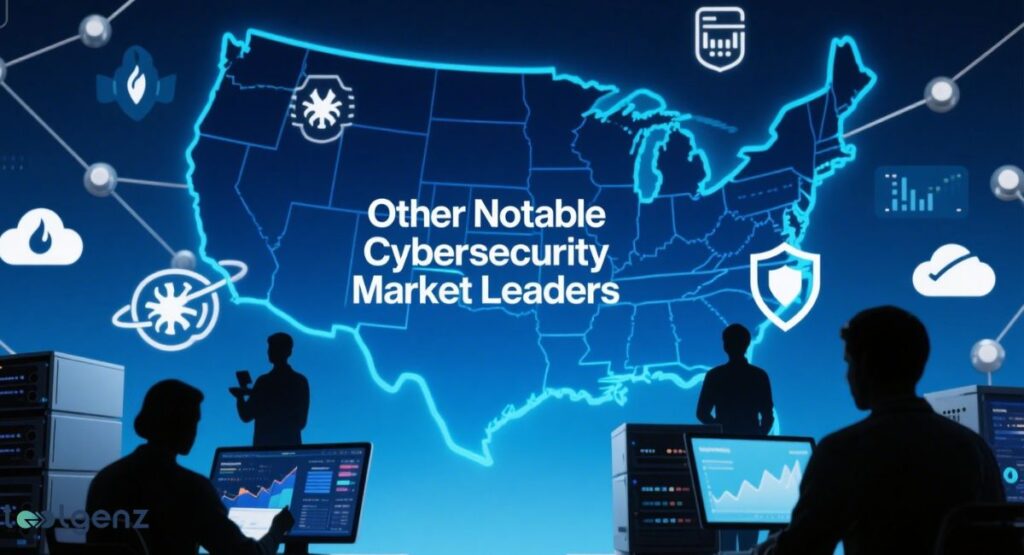
Beyond the giants, many rising firms are making waves in 2025. Huntress focuses on malware prevention tools and cybersecurity for small businesses.
Arctic Wolf is popular for its managed detection and response (MDR) solutions. Bitdefender and ESET offer affordable and trusted antivirus software worldwide.
Tanium stands out for its strong vulnerability management and cyber risk management tools.
Rapid7 and SentinelOne offer powerful penetration testing services and behavioral analytics to spot threats before they spread.
These companies are trusted by small businesses and large corporations alike for reliable network protection services.
Their tools are also well-suited for startups, offering lightweight cybersecurity software for startups that scales as businesses grow.
Many of these platforms integrate secure cloud access, insider threat detection, and data breach protection for all-around security.
Best Cybersecurity Software in 2025: Shortlist
| Software Name | Best For | Key Features |
| CrowdStrike Falcon | Enterprise Security | AI-powered cyber defense, endpoint |
| Bitdefender Gravity | SMBs & Startups | Antivirus software, firewall, ransomware tools |
| SentinelOne Singularity | Automation & AI Threat Blocking | Behavioral analytics, fast incident response |
| Norton 360 for Business | Small Business Data Protection | Malware protection, cloud backup, MFA |
| Arctic Wolf MDR | Managed Services | 24/7 monitoring, threat detection, SIEM |
Detailed Cybersecurity Software Reviews
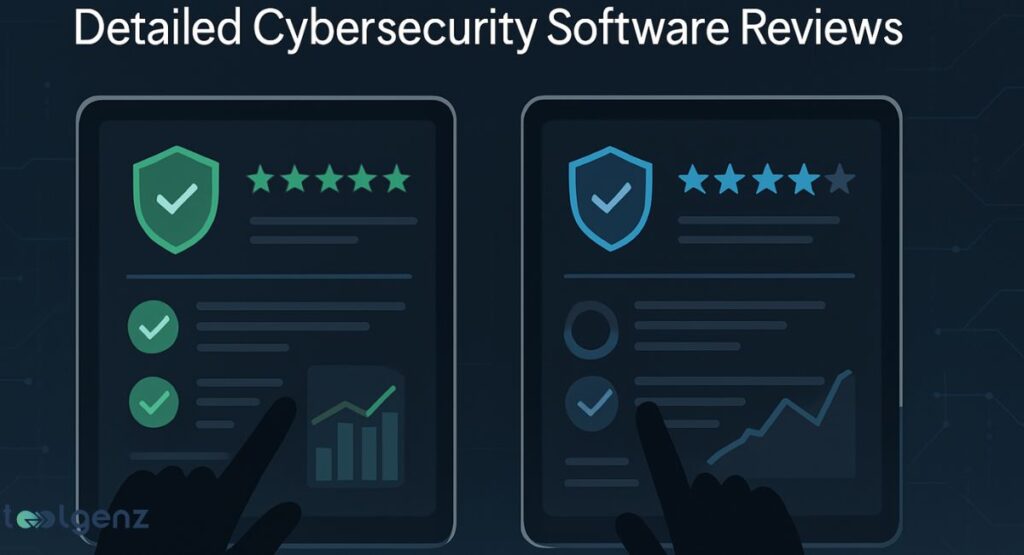
CrowdStrike Falcon is ideal for large businesses that want AI-powered threat prevention.
It uses user behavior analytics to block attacks before they start. Its endpoint security software is easy to install and comes with expert support.
Bitdefender GravityZone is a strong all-rounder, especially for startups. It packs in malware protection, a solid firewall, and file encryption—all at a price that works for small business budgets.
It’s a smart pick for teams looking to stay secure and compliant without overspending.
Norton 360 for Business adds extra value with secure cloud-based cybersecurity and password management.
They also help teams stay ahead of threats with regular vulnerability scans, real-time alerts for insider risks, and tools that automate emergency responses when seconds matter.
Their lightweight design makes them perfect for fast-growing businesses that need strong protection without slowing down operations.
How to Choose the Right Cybersecurity Software
Selecting the right software depends on your needs. Start by identifying your risks.
A small business may need SIEM tools for small businesses, while a tech startup may prioritize ransomware protection or incident response platforms.
If you’re using remote teams, pick software that includes secure cloud access and behavioral analytics.
Always check if the vendor offers penetration testing services, regular updates, and strong customer support.
Ensure tools meet your industry’s compliance regulations and can handle future threats. Cost, scalability, and ease of use are also big factors.
Some companies also benefit from integrating user access control, firewall protection systems, and cyber threat intelligence into one platform.
Picking a solution with these combined features can reduce complexity and improve cyberattack prevention.
2025 Trends in Cybersecurity Software
AI is making a major impact in 2025—many tools can now anticipate and block threats before they even hit your system.
Zero trust security is growing fast, especially in remote work environments. Companies verify every access request, no matter who or where.
Consider reading our Managed Telecom Services 2025 Ultimate Guide to understand how telecom and cybersecurity converge in business infrastructure.
Security awareness training, insider threat detection, and cloud security tools are also becoming must-haves in 2025.
In addition, more organizations are turning to advanced data breach protection and automated patch management tools.
These innovations help reduce human error and provide stronger defenses against evolving cyber threats.
Costs & Pricing for Cybersecurity Software
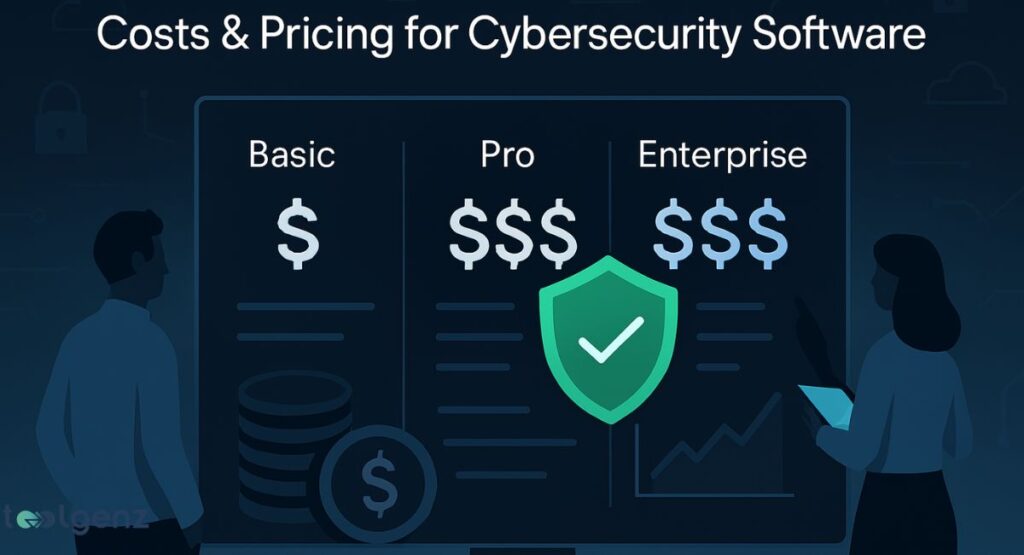
Prices vary based on features, company size, and support needs. Small businesses can expect to pay between $10 to $50 per user per month.
Enterprise-grade platforms may cost hundreds or more. Some offer free trials or bundles with other security tools for SMBs.
| Plan Type | Average Monthly Cost/User | Best For |
| Basic | $10–$20 | Startups, Freelancers |
| Standard | $25–$50 | Growing Small Businesses |
| Enterprise | $100+ | Large Corporations |
Why Trust Our Cybersecurity Reviews?
We base our reviews on real-world testing, not ads or paid promotions. Our team works with IT experts and business owners to compare tools in real use.
We look at how each tool performs in data breach protection, vulnerability assessments, and ease of use.
We also test for compliance regulations, customer support quality, and long-term reliability.
Our rankings reflect the best value for the money based on deep research. We update these reviews regularly as the market evolves.
This hands-on approach helps us highlight tools that truly work for cybersecurity for small businesses, especially those needing simple yet powerful solutions.
Whether you’re seeking endpoint protection or advanced cyber risk management, our reviews are designed to guide smart decisions.
Methodology: How We Selected These Cybersecurity Leaders
Our research process includes checking industry reports, testing software features, and interviewing experts.
We use threat simulations to test real-world performance. Explore official updates directly from CISA, a leading authority on cybersecurity threats and infrastructure protection.
We ranked companies based on protection strength, ease of use, price, innovation, and user support.
Tools with cyberattack prevention tools, user access control, and data breach response tools scored higher. This ensures you get the most reliable and updated information.
We also considered features like firewall protection systems, insider threat detection, and multi-layered cloud security.
By covering all key factors, our guide helps you choose the best cybersecurity solution for your unique business needs in 2025.
FAQs
1. How do I set up cyber security for my small business?
Start by installing antivirus software, setting up firewalls, using strong passwords, enabling multi-factor authentication, training employees, and backing up data regularly.
2. What are the 5 C’s of cyber security?
They are Change, Compliance, Cost, Continuity, and Coverage, focusing on adapting, following laws, budgeting, resilience, and full protection.
3. How much does cyber security cost for a small business?
Costs typically range from $1,000 to $15,000 per year, depending on your business size, tools, and level of protection needed.
4. What are the 10 types of cyber security?
They include Network Security, Cloud Security, Endpoint Security, Application Security, Data Security, Identity Management, IoT Security, Mobile Security, Disaster Recovery, and Operational Security.
5. How much should a business spend on cybersecurity?
Experts recommend 7–10% of the IT budget be spent on cybersecurity, though higher-risk industries may need more.


